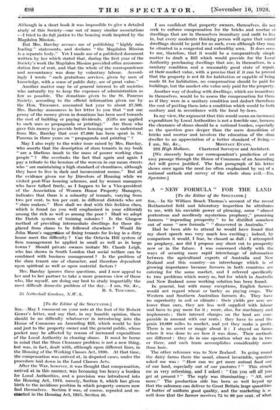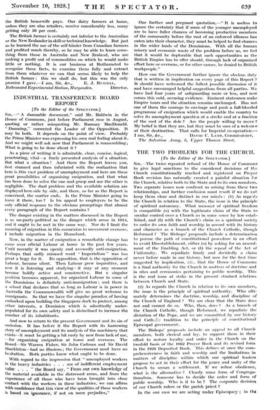A "NEW FORMULA" FOR THE LAND
[To the -Editor of the SPECTATOR.] SIR,—In Sir William Beach Thomas's account of the recent Rothamsted field and laboratory inspection he attributes to me, with his enviable power .of phrasing, some "almost portentous and needlessly mysterious prophecy," promising farmers "impending prosperity" to be distilled. somehow out of some "new formula" "discovered in Australia."
Had he been able to attend he would have found that my short speech was very much less exciting; indeed, by comparison it would, I fear, be classed as dull : I attempted no prophecy, or did I propose any short cut to prosperity now or in the future. I was concerned chiefly with the ways Of securing more rapid interchange . of information between the agricultural experts of Australia and Nev Zealand and this country—an interchange which is. of growing importance because . farmers in both countries are catering for the same. market, and I referred specifically to two problems which worry us, but for which, in Australia and New Zealand some working solution has been . found. .
In general, but with many exceptions, English farmers would not regard wheat or barley as paying crops. The Western and Southern Australian formers do. They have no superiority in soil or climate: their 'yields per acre are lower than ours, they are less well Supplied With labour and have to pal more for it ; more also for :Machinery and implements, their interest charges on the 'land are .coni- parable in amount with our rents ; they have "to send the grain 10,000 Miles to market, and yet they "make ""a profit. There is no secret or 'Magic- about it I stayed oil' Wins where it Was" done to see "how' it was done.. Their methods are different ": they do in one Operation 'what" we do in two or three; 'and each team accomplishes" considerably more than here.
The 'other reference *as to New Zealand". In going rOhnd the dairy' farms there the usual, almost "invariable,' question asked me was: "How Can' we get more animal food out of our land, especially out of our pastures?" This struck inc as very ref-milling, inid-I asked "Can you sell all you get at present ? ". The reply was illuminating : •" All, and more." The 'production side has- been so' well keyed up that- the salesmen can deliver to Great Britain large quantities of butter of" ninfotin good quality, and the' marketing is sc well done that the farmer receives 75 to. 80 per cent. of 'what
the British housewife pays. Our dairy farmers at home, unless they are also retailers, receive considerably less, many getting only 50 per cent.
The British farmer is certainly not inferior to the Australian or the New Zealander in skill or technical knowledge. But just as he learned the use of the self-binder from Canadian farmers and profited much thereby, so he may be able to learn some- thing from those in Australia and New Zealand, who are making a profit out of commodities on which he would make little or nothing. It is our business at Rothamsted to recognize these facts, to examine them fully and extract from them whatever we can that seems likely to help the British farmer : this we shall do, but this was the only
promise I gave.—I am, Sir, &c., E. J. RUSSELL,
Rothamsted Experimental Station, Harpenden. Director.













































 Previous page
Previous page